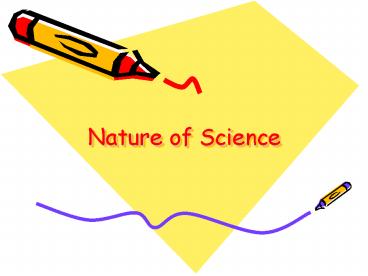Nature of Science - PowerPoint PPT Presentation
1 / 24
Title:
Nature of Science
Description:
Nature of Science NOS Card Exchange Step 1: Obtain 8 cards (that are different from one another). Step 2: Trade cards with classmates in order to amass a better ... – PowerPoint PPT presentation
Number of Views:446
Avg rating:3.0/5.0
Title: Nature of Science
1
Nature of Science
2
NOS Card Exchange
- Step 1 Obtain 8 cards (that are different from
one another). - Step 2 Trade cards with classmates in order to
amass a better collection of cards. (Your
collection improves as the cards more accurately
express your views on science.)
3
- Find a partner with similar views and select the
8 best cards from the 16 that you have
collectively. (Each of you must contribute at
least 2 cards.) - Make a group of 4 and select the 8 best cards.
- Using the remaining cards, write a statement
which describes your groups notion of the Nature
of Science.
4
VNOS(c)
- What in your view is science? What makes science
different from other disciplines of inquiry? - What is an experiment?
- Does the development of scientific knowledge
require experiments? - After scientists have developed a scientific
theory, does the theory every change? - Is there a difference between a scientific theory
and a scientific law?
5
- How certain are you about the structure of an
atom? What specific evidence do you think
scientists used to determine what an atom looks
like? - How certain are scientists about their
characterization of what a species is? What
specific evidence do you think scientists used to
determine what a species is? - Does science reflect social and cultural values
or is it universal? - Do scientists employ creativity in their
investigations? If so where and how?
6
What is the Nature of Science (NOS)?
- Science cannot be singularly (and definitively)
defined because it is interpreted in different
ways by different people. - Methods such as the card sort and NOS surveys
encourage students to think specifically about
their views on science. - Scientists, science educators philosophers of
science have proposed some consensus views on
NOS. - Views on NOS describe how the scientific
enterprise operates.
7
Consensus Views on NOS
- Empirically-based
- Scientific knowledge is based on evidence.
- Testable
- Scientific ideas can be theoretically falsified
through evidentiary tests. - Tentative, yet Reliable
- Scientific ideas can change given new data or new
interpretations - Developmental
- Scientific ideas are often built on earlier ideas.
8
Consensus NOS Views
- Creative
- Scientists employ creativity in posing questions,
collecting data, and interpreting data. (What
does this suggest about The Scientific Method?) - Parsimonious
- Given multiple explanations, scientists tend to
favor the simplest one that maintains predictive
power. - Unified
- Scientific ideas are consistent across different
disciplines.
9
Consensus NOS Views
- Culturally-embedded
- Scientists scientific ideas are influenced by
the society from they arise. - Theory/Law Distinction
- Scientific theories are robust, empirically
supported explanations of natural phenomena.
Scientific laws are perceived regularities
regarding the natural world. Therefore, theories
never become laws. Laws are typically more narrow
in focus than theories.
10
Provide examples from the history of science to
support each NOS aspect.
- Creative
- Culturally embedded
- Tentative
- Developmental
- Parsimonious
- Theory/Law distinction
11
NOS Aspects addressed by the Water-Making Machine
- Empirical-Testable
- Creative
- Tentative
- Developmental
- Parsimonious
12
Empirical NOS
- Made observations (a form of data collection).
- Made inferences based on those observations.
- However, you were not able to manipulate
variables yourself.
13
Creative NOS
- Used creativity in the design of your models.
- Construction of models important for many areas
of science - Atoms
- Dinosaurs
- Earth Structure
- Ecological Interactions
- Engineering Applications
14
Tentative NOS
- Are you absolutely sure that your model perfectly
describes the black box mechanisms? - Is your model a completely wild guess or is it
based on some knowledge?
15
Developmental NOS
- Individual group models might be modified by
comparing them against other models.
16
Parsimonious NOS
- Is it more likely that the mystery of the
water-making machine is amazingly complex or
relatively simple?
17
NOS Aspects Addressed by the Mystery Cups
- Empirical-Testable
- Tentative
18
Empirical-Testable NOS
- Collected data while testing different objects.
19
Tentative NOS
- Were you able to identify the content of all cups
using scientific processes? - Were you able to confidently determine the
content of some cups using scientific processes?
20
Black Box Activities
- Water-making machine
- Tubes
- Coffee can
- Mystery cups
- Frankies Brain
- Simulation of Rutherfords experiment
21
Scientist Activity (pairs)
- Use the internet and library resources to
research a scientist and his/her findings. - Background Describe the historical context of
the work. What was known at the time? - Contributions Provide a brief overview of what
s/he discovered, postulated, etc. - Processes Describe how this scientist did
his/her work. Discuss the nature of his/her
experiments, observations, inferences, etc.
22
Presentations
- Each pair will provide the class with a brief
overview of their scientist, his/her discoveries
his/her methods. - Following the presentations, each small group
will create a concept map for organizing the
information presented.
23
- What can we infer about the scientific enterprise
based on these findings?
24
Myths of Science
- Which of McComas myths should not be myths?
- How do these myths influence public
understandings of science? - How do science teachers perpetuate these myths?
- How can science teachers help eliminate these
myths? - Can you think of other common myths of science
not enumerated by McComas?































